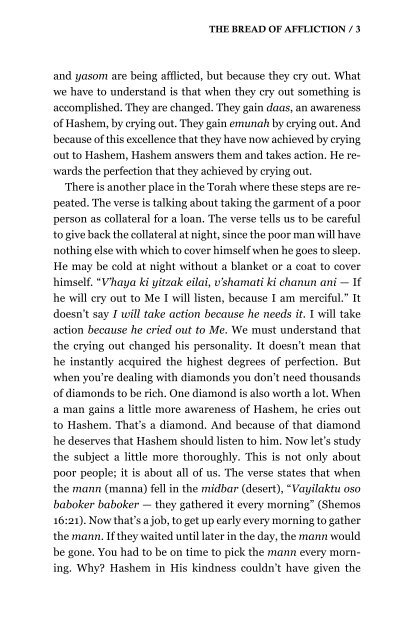Bread of Affliction
Create successful ePaper yourself
Turn your PDF publications into a flip-book with our unique Google optimized e-Paper software.
The <strong>Bread</strong> <strong>of</strong> <strong>Affliction</strong> / 3<br />
and yasom are being afflicted, but because they cry out. What<br />
we have to understand is that when they cry out something is<br />
accomplished. They are changed. They gain daas, an awareness<br />
<strong>of</strong> Hashem, by crying out. They gain emunah by crying out. And<br />
because <strong>of</strong> this excellence that they have now achieved by crying<br />
out to Hashem, Hashem answers them and takes action. He rewards<br />
the perfection that they achieved by crying out.<br />
There is another place in the Torah where these steps are repeated.<br />
The verse is talking about taking the garment <strong>of</strong> a poor<br />
person as collateral for a loan. The verse tells us to be careful<br />
to give back the collateral at night, since the poor man will have<br />
nothing else with which to cover himself when he goes to sleep.<br />
He may be cold at night without a blanket or a coat to cover<br />
himself. “V’haya ki yitzak eilai, v’shamati ki chanun ani — If<br />
he will cry out to Me I will listen, because I am merciful.” It<br />
doesn’t say I will take action because he needs it. I will take<br />
action because he cried out to Me. We must understand that<br />
the crying out changed his personality. It doesn’t mean that<br />
he instantly acquired the highest degrees <strong>of</strong> perfection. But<br />
when you’re dealing with diamonds you don’t need thousands<br />
<strong>of</strong> diamonds to be rich. One diamond is also worth a lot. When<br />
a man gains a little more awareness <strong>of</strong> Hashem, he cries out<br />
to Hashem. That’s a diamond. And because <strong>of</strong> that diamond<br />
he deserves that Hashem should listen to him. Now let’s study<br />
the subject a little more thoroughly. This is not only about<br />
poor people; it is about all <strong>of</strong> us. The verse states that when<br />
the mann (manna) fell in the midbar (desert), “Vayilaktu oso<br />
baboker baboker — they gathered it every morning” (Shemos<br />
16:21). Now that’s a job, to get up early every morning to gather<br />
the mann. If they waited until later in the day, the mann would<br />
be gone. You had to be on time to pick the mann every morning.<br />
Why? Hashem in His kindness couldn’t have given the



